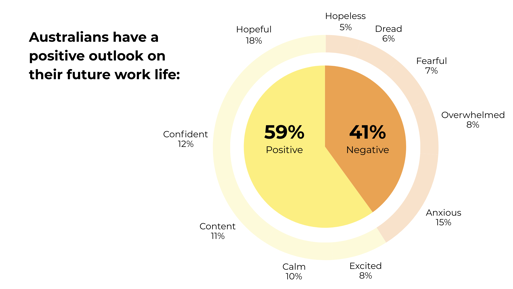What's on this page?
Jump to:
- Reasons You Might Consider a Career Change at 40
- Five Common Reasons for Changing Career at 40
- Five Advantages of a Career Change at 40
- Challenges of Changing Careers at 40 (And How to Overcome Them)
- How to Retrain and Change Careers at 40: 5 Key Actions
- What NOT to Do When Changing Careers at 40
- A Career Advisor’s Advice: Quick-Fire Top Tips for Changing Careers at 40
- The Best-Paid Careers and Roles for Mid-Life Career Changers
- Student Success Story: Changing Careers at 40
- Final Thoughts: How to Change Careers at 40 and How Learning People Can Help You
- FAQS on Changing Careers at 40
Reasons You Might Consider a Career Change at 40
By the time you reach your 40s, you’ve likely built up a couple of decades of work experience – and life experience, too. You know what it’s like to stick with something, to make trade-offs, and to keep going even when it doesn’t quite feel right anymore. It’s also around this age that people often start to reassess what success looks like to them, and what they want their next 20 years to look like.
This kind of reflection is totally normal. Psychologists talk about how our 40s mark a distinct shift into a new stage of life where we start thinking less about ticking boxes, and more about doing something meaningful, sustainable, and purposeful.
For many, that shift coincides with big life changes like raising a family, supporting ageing parents, or simply hitting a point where financial security starts to matter more than chasing status.
All of this can lead to a simple, honest realisation: “This career doesn’t fit me anymore.” And that’s the moment many people decide it’s time for something new.
Five Common Reasons for Changing Career at 40
Everyone’s reasons are different, but there are some recurring themes that come up again and again in our conversations with career changers in their 40s:
- You want more meaningful work: After years in the same industry or role, it’s common to want a job that feels more aligned with your values. At this stage in life, many people are drawn to work that has purpose, impact, or simply feels more “you.”
- You’re looking for long-term financial stability: Career changers in their 40s often have mortgages, children, or other financial responsibilities. Shifting into a future-proof industry, like tech or project management, can offer more reliable income and progression in the long run.
- Your priorities have changed: What mattered at 25 might not feel as important at 45. Flexibility, family time, job satisfaction – these things often take precedence as life evolves.
- You’ve hit a ceiling in your current career: It’s not unusual to reach a point where there’s no clear next step. Whether it’s due to lack of growth, redundancy, or boredom, 40 can be the catalyst for choosing something better.
- You want to future-proof your working life: With retirement still decades away, now is the time to build a career that has staying power, ideally in a field with strong demand and ongoing development opportunities.

Five Advantages of Career Change at 40
Everyone’s reasons are different, but there are some recurring themes:
- You bring years of transferable skills: With two decades of professional experience under your belt, you’ve likely developed problem-solving, communication, leadership, and time management skills that are highly valued in almost any sector.
- You offer reliability and maturity: Employers often appreciate the calm, consistent presence that career changers in their 40s can bring. Many hiring managers are actively looking for people with life experience and proven commitment.
- You understand what you want (and don’t want): By this point, you’re more likely to have clarity about your strengths, interests, and deal-breakers. This can make you a more focused, motivated candidate.
- You’ve worked with a wide range of people: Whether you’ve managed teams, collaborated across departments, or dealt with clients and customers, your interpersonal experience is a real asset in roles that require empathy, communication, or stakeholder management.
- You’re not starting from scratch: Even if you’re entering a new field, you’re likely to carry over soft skills, work habits, and industry knowledge that can fast-track your progress in a new career.
A career consultant's view on career changes at 40
"When I talk to people about changing career mid-life, I often talk about how they can highlight their existing professional and life experience in a way that will impress a potential employer. I also often refer to how they should highlight their key transferrable skills from their previous work.
The truth is that some employers will value the reliability and maturity that career-changers in their 40s will bring to a role; these are qualities they may not get from a younger hire. They may also appreciate a candidate who shows previous dedication to a particular role, company, or industry.
It’s worth noting that 80% of the people that undertake training with us at Learning People are career changers, and most of these are changing their careers later in life, so after 35, 40, or 50. It’s not only a possible thing to do; for many people, 40 is a particularly advantageous time to pivot careers!"
Challenges of Changing Careers at 40 (And How to Overcome Them)
Changing careers at 40 isn’t without its hurdles, and it’s important to be honest about them. But these challenges are certainly not insurmountable. In most cases, they can be worked through with the right mindset, support, and strategy.
- Financial pressure: At 40, you might be managing a mortgage, family expenses, or saving for the future – making any career move feel risky.
- To ease this, many learners retrain part-time or online so they can earn while they study and stagger the transition. All of the courses we offer, for example, can be completed in this way.
- Fear of starting over: The idea of becoming a beginner again can feel uncomfortable. But remember: you’re not starting from zero. You’re building on everything you’ve already achieved.
Imposter syndrome or low confidence: Many mid-life learners worry they won’t “fit in” or keep up.- Confidence coaching, career mentoring, and real-world project training (like the kind we offer) can help close this gap quickly.
- Worries about age discrimination: While ageism exists, many employers actively value experience, dependability, and resilience; these are qualities often associated with mature career changers.
- Be ready to talk about and give examples of how you have demonstrated these qualities on your career-change CV and in interviews (more on this later in the article)
- Fear of the unknown: The biggest blocker we hear when advising people on changing career? “What if it doesn’t work out?” That’s a valid fear, but staying stuck has risks too.
- Talk to people close to you and in your support network about your fears to help circumnavigate them as blockers to your progress. Getting support from a career consultant can help you map out a realistic plan and take the next step with clarity.
Mid-life career-changers in Australia are holding back...
Recent reports from the Australian Bureau of Statistics revealed that nearly one in 10 Australians switched jobs in the past year in a large shift that's been named the 'Mass exodus' or 'The Great Reshuffle'.
However, data from one of the regions largest job search websites, SEEK, also reported that while 57% of Gen X (roughly ages 40–54) regret career choices they've made over their life so far, only 7% are pro-actively looking to switch to a new career. The main reasons for this are that they worry it's too late, or it's too much of a financial risk.
My take as a career advisor: it is absolutely not too late to change career as a Gen-X-er, and retraining for a career switch is something you can do while still in you current job thanks to flexible online learning options, like the courses we offer at Learning People.

How to Retrain and Change Career Successfully at 40: 5 Key Actions
Deciding to change careers at 40 is a bold and positive step. But it’s normal to feel unsure about how to kickstart this mission or what to do next. Here’s a clear, realistic plan we recommend to help you navigate the transition confidently:
- Define what’s driving your change: Before anything else, get clear on why you want to change. Is it more purpose? Better pay? Less stress? Knowing what you need from your next role helps you avoid jumping from one unfulfilling job to another.
- Explore sectors that suit your skills and goals: Look into industries that align with your values, interests, and existing strengths. Tech, cyber security, project management, and data are all popular with mid-life career changers for their growth, flexibility, and pay potential.
- Start building your support network: Reach out to people already working in your target field. Use LinkedIn, industry events, or training forums to connect with others who’ve made the leap – it helps more than you’d think.
- Plan for practical retraining: Most people in their 40s retrain part-time or online. Choose training that fits around your life, helps you gain recognised qualifications, and gets you job-ready fast.
- Refresh your CV and interview mindset: A career-change-friendly resume/CV should spotlight your transferable skills, not just your job titles. And when it comes to interviews? Be ready to explain your “why” with clarity and confidence, as it’s often your biggest strength.
What NOT to Do When Changing Careers at 40
When you’re planning a big move like this, how you go about it matters just as much as what you do. Here are three common mistakes we’ve identified after years of giving career advice, and why it’s worth avoiding them:
- Waiting until you “have it all figured out”: The truth is, most people never feel 100% ready. If you wait until everything’s perfectly mapped out, you may never get started. It’s okay to take small, low-risk steps (research, training, part-time study) while you figure out your direction.
- Letting fear of failure paralyse you: At 40, it’s easy to think you’ve got too much to lose. But staying stuck in the wrong role carries risks too, like burnout, missed opportunities, or long-term regret. A career change doesn’t have to be reckless to be worthwhile.
- Underestimating your value: Just because you’re moving into a new field doesn’t mean you’re starting from zero. Your life and work experience count, but only if you recognise and communicate it. Don’t talk yourself out of opportunities before you’ve even tried.

A Career Advisor’s Advice: Quick-Fire Top Tips for Changing Careers at 40
If I could pass on just a handful of pointers to someone changing careers in their 40s, these would be at the top of the list:
- Don’t downplay your experience: You’ve got 20+ years of workplace wisdom. That’s a serious asset. Learn to frame your past roles in terms of transferable skills, not just job titles.
- Choose training that’s built for working adults: If you’re juggling work, kids, or caring responsibilities, flexibility matters. Look for courses that offer self-paced study, hands-on practice, and recognised qualifications.
- Practice your “career change story”: When you start interviewing, be ready to talk about why you’re switching paths and what you’re bringing to the table. Keep it confident, clear, and future-focused.
- Avoid the all-or-nothing trap: You don’t have to quit everything overnight. Plenty of our students retrain while working part-time or use evenings and weekends to build new skills.
- Connect with people who’ve done it: Talking to others who’ve made mid-life career changes, especially in your chosen field, can offer both encouragement and real-world insight. You don’t have to do this alone.
The Best-Paid Career Ideas and Jobs for Mid-Life Career Changers
Changing careers at 40 isn’t about starting over; it’s about starting smarter. With the right training, there are a number of high-paying, future-focused roles that are well suited to people bringing years of experience, strong work habits, and maturity to the table.
Here are some of the most popular (and practical) options:
1. Project Manager
If you’ve led teams, juggled deadlines, or kept things running smoothly in your past roles, project management is a natural fit. Roles in tech, construction, or business operations often pay well and value experience. Certifications like AgilePM® are widely recognised and can be gained in a matter of months.
2. Cyber Security Analyst
With demand exploding across the UK, Australia, and beyond, cyber security is one of the most secure, and well-paid, career paths today. You don’t need a degree, just focused training and certification in areas like CompTIA Security+ or CISSP.
3. IT Support or Systems Administrator
These are great entry points into the tech world, offering strong starting salaries, clear progression routes, and hybrid working options. If you enjoy problem-solving and learning on the job, this route is highly achievable.
4. Data Analyst
For those who like detail, patterns, or decision-making, data analytics is a powerful option. Training in tools like Excel, SQL, or Python can open doors quickly. And salaries tend to rise fast as your skills grow.
5. AI and Cloud Roles (e.g. Cloud Engineer, AI Support Specialist)
These are fast-growing sectors where retraining can lead to exciting roles in under a year. Many mid-life learners come from business or admin roles and pivot into cloud support, platform engineering, or AI-adjacent tech.
Each of these fields welcomes career changers with real-world experience, and pays accordingly.
Student Success Story: Changing Careers at 40
In the 15 years that Learning People has been operating, we've helped just shy of 50,000 students gain new certifications, and thousands of these have landed new roles. This includes many who are 40+ years old.
Take Andrew, for example, who at 40 years old made the switch into a fulfilling career in cyber security. You can hear more about his journey and successful career change in his video below, or have a look at more of our student success stories:
Andrew Macdonald
Andrew decided it was time for a career change and wanted to get into cyber security so enrolled on a course with Learning People. Even after 40, he managed to secure his qualifications and a new role in his desired field.
Final Thoughts: How to Change Careers at 40 and How Learning People Can Help You
Changing careers at 40 shouldn’t be seen as a setback; it’s a strategic move towards something more aligned, stable, and fulfilling. With the right support, retraining options, and mindset, it’s not only possible, it’s often the smartest decision you can make at this stage in life.
At Learning People, we’ve helped thousands of people in their 40s retrain for in-demand roles in tech, cyber security, project management, and more. Our expert-led courses are designed for busy adults, and our career consultants are here to guide you through every step of your transition.
If you're ready for a fresh start in 2026, leave your details below and one of our consultants will be in touch to talk things through.




